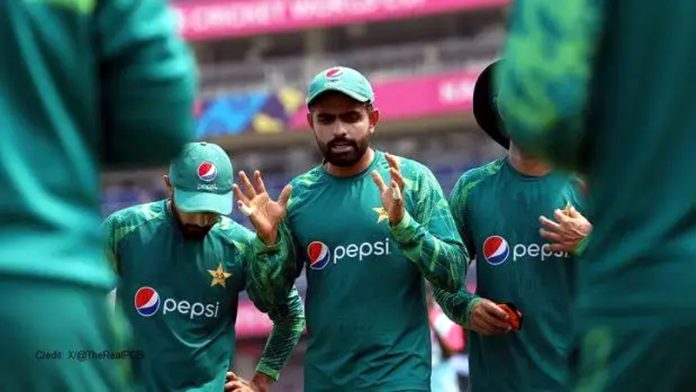CHENNAI, Oct 26: His captaincy on line after a hat-trick of defeats, Babar Azam will be keen to find some inspiration and that exclusive piece of Pakistani magic when his team squares off against a formidable South Africa in a do-or-die game of the World Cup here on Friday.
One more defeat and knock-out doors will be shut on Pakistan and Babar, who is already feeling the heat, might end up losing captaincy as it will be virtually impossible for his team to salvage the campaign in remaining three games even if it wins those.
“Looking ahead, the board will make decisions in the best interest of Pakistan cricket based on the team’s performances in the World Cup. At present, the PCB encourages fans, former players and stakeholders to rally behind the team as they strive to make a triumphant comeback in the mega-event,” PCB’s statement ahead of an important will only increase tremendous pressure on skipper and the team.
From hereon, Pakistan needs to win all its matches and expect Australia to falter in at least two of their remaining four games.
There’s a saying in world cricket that one doesn’t know which Pakistan team will turn up on a particular day. There could be a geniuses at work one day and on other days, they could even embarrass themselves leave alone their legion of fans.
A gutsy Pakistan team is always necessity for a global tournament like World Cup and Babar would expect that against a rampaging South Africans, it would produce a world class performance.
The gulf in performance between two teams has been huge despite Proteas’ shock defeat against the Netherlands at Dharamsala.
Quinton de Kock and Heinrich Klaasen has headlined the batting with timely contributions from others like Aiden Markram while Pakistan’s archaic batting approach has left them in dire straits at the halfway of the league stage.
The difference in approach is evident when one looks at the boundary count of the two sides. South African batters have hit 155 fours and 59 sixes while Pakistan managed only 24 sixes in five games and 136 boundaries.
An embarrassing statistic is Pakistan batters hitting a six in Powerplay after consumption of 1200 deliveries across games in first six overs.
While De Kock, Klaasen, Markram, David Miller, all-rounder Marco Jansen have all had a strike-rate of over 100, only Saud Shakeel and Iftikhar Ahmed, the two middle-order batters have barely crossed the three-figure strike-rate.
In bowling, Shaheen Shah Afridi hasn’t been able to bowl his customary nip-backers consistently in opening spell and Haris Rauf’s effectiveness in 50 over cricket has come under scanner. Rauf’s back of length one dimensional bowling has hurt Pakistan as much as Naseem Shah’s absence.
Hasan Ali isn’t good enough for ODIs with distinct lack of penetration and it won’t be bad to try out a Zaman Khan or Muhammad Wasim Junior to bring in some variety.
However the biggest weakness for Pakistan at the Chepauk will be lack of quality spinners. It is understandable that playing leg-spinner Usama Mir in both games has backfired and with an economy rate of over 8, he might not get another game.
Shadab Khan has been equally ordinary and if one is honest, the Pakistan vice-captain would struggle to make it to any decent Indian first-class side. He is not even in the league of Mayank Markande, Rahul Chahar and Suyash Sharma, the three IPL regulars, who are not even in India contention.
Having a left-arm spinner like Mohammed Nawaz will hardly solve their problem as he is neither a restrictive option nor a wicket-taking one.
The South Africans are in a better position compared to the Pakistanis, who are in a must-win situation in every clash hereon.
A win for the former would put them firmly in contention to qualify for the semi-finals.
On the other hand, for South Africa, everything has been going great for the side. With the bat, opener de Kock has been in flawless form, and being the tournament’s top run-getter so far proves everything.
As for their bowling, their pacers Kagiso Rabada, Jansen and Gerald Coetzee have simply ripped apart the batters in the competition so far, and the Pakistani batters have a tedious task at their hands to counter them, even on the slow Chepauk surface.
Keshav Maharaj has been a calming influence in the middle overs with seven wickets but more importantly, economy rate of 4.60, which showed his control in the most important phase of the game.
In head-to-head record, Proteas enjoy a 51-30 in 82 clashes. (PTI)
Trending Now
E-Paper


